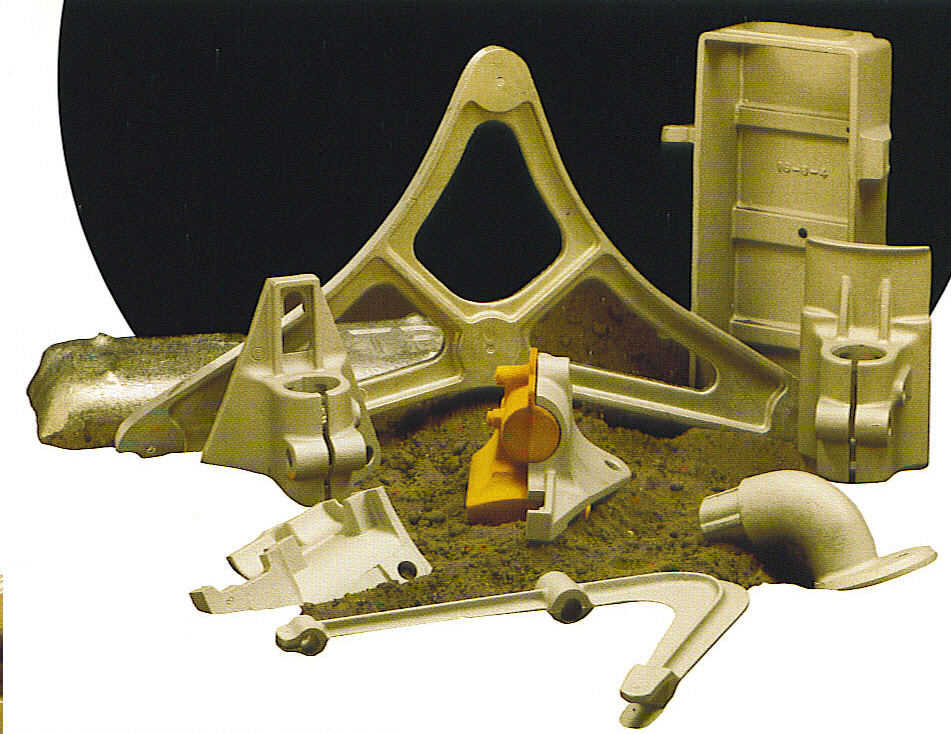Some Known Details About Aluminum Castings Company
Table of ContentsHow Aluminum Castings Company can Save You Time, Stress, and Money.Aluminum Castings Company - The FactsNot known Details About Aluminum Castings Company Aluminum Castings Company Fundamentals ExplainedFacts About Aluminum Castings Company UncoveredThe Only Guide to Aluminum Castings CompanyIndicators on Aluminum Castings Company You Should KnowSome Known Questions About Aluminum Castings Company.
There are 2 key types of die casting utilized in the light weight aluminum casting industry: hot chamber die spreading and cool chamber pass away casting. The main distinction in between these methods is just how the molten metal is delivered to the mold. In hot chamber die spreading, generally made use of for lower melting factor metals, the fusion is directly connected to the machine, and a plunger forces the material through a gooseneck into the die tooth cavity.
Some Known Details About Aluminum Castings Company
In these techniques, the mold and mildew is deliberately ruined or escaped in order to remove the finished aluminum casting. Common processes under the classification of expendable mold and mildew spreading consist of (financial investment spreading),,, and financial investment spreading. When making custom-made aluminum components making use of expendable mold and mildews, producers put molten aluminum or aluminum alloys into the mold and mildew, which is after that busted apart to launch the strengthened steel component.
The is among the oldest and most commonly used forms of light weight aluminum spreading. It entails condensing specialty foundry sand, often reinforced with clay or material, around a precisely crafted multiple-use pattern that identifies the shape and inner details of the finished light weight aluminum item. The pattern system includes risers and vents to take care of the circulation of liquified metal and to stop casting flaws such as contraction porosity.
Some Known Details About Aluminum Castings Company

This mold is after that preheated previous to the putting of molten light weight aluminum or aluminum alloy. As the metal fills the covering, it captures the detailed information and great surface area finish of the mold. Once cooled, the ceramic is mechanically or chemically broken away, permitting the elimination and splitting up of individual actors components.
The Basic Principles Of Aluminum Castings Company
Long-term mold spreading utilizes reusable steel mold and mildews and is optimal for mass production with regular high quality and much less waste. Expendable mold casting uses single-use molds, like sand or foam, offering style adaptability and lower tooling prices for models or short runs. Die casting is best for creating high volumes of light weight aluminum components that require tight tolerances, great information, and smooth surfaces.
The Carat weight includes advanced control systems for exact procedure management, consisting of automated ladling, real-time quality control, and energy-efficient operation. The Toshiba Maker DC-J Collection consists of die casting makers ideal for light weight aluminum. Understood for their durable building and high shot efficiency, these devices make certain effective and accurate casting. They include sophisticated hydraulic and control systems for regular quality, together with real-time monitoring, automated lubrication, and easy to use programming user interfaces.

While aluminum can be used in its pure type, it is commonly alloyed with other metals to improve its buildings or the properties of the other metals. Aluminum alloys are classified right into 8 collection, numbered from one to 8.
How Aluminum Castings Company can Save You Time, Stress, and Money.
This alloying improves the strength and solidity of aluminum but reduces its ductility and corrosion resistance. The 2000 series alloys are challenging to weld however can be heat dealt with to improve their buildings. The 3000 collection alloys are primarily alloyed with manganese. This combination enhances corrosion resistance while giving moderate stamina.
The 4000 collection alloys are alloyed with silicon, which decreases the melting factor and enhances fluidity. This makes it a prominent selection for casting, as it is very easy to form in its liquified state.
The Best Strategy To Use For Aluminum Castings Company
This collection is identified as a high-strength alloy, specifically matched for sheet and plate applications as a result of its excellent weldability. Its resistance to deterioration from acids and antacid makes it perfect for usage in harsh and aggressive environments (Aluminum Sand Castings). The 6000 collection alloys are alloyed with both magnesium and silicon, offering a balance of toughness, mechanical residential properties, and rust resistance
Processing the 6000 series needs specialized and innovative devices, which can be intricate and costly. However, this collection blog is understood for its exceptional deterioration and oxidation resistance, as well as its ease of covering, therapy, and workability. The 7000 collection light weight aluminum alloys are the greatest and most resilient amongst light weight aluminum kinds, with toughness similar to about two-thirds of industrial-grade A3 steel.
The Buzz on Aluminum Castings Company
Zinc is the primary alloying component in the 7000 collection, improving the solidity of the aluminum, although zinc's hardness is similar to that of light weight aluminum on the Mohs scale. The 8000 collection aluminum alloys are mostly alloyed with tin, along with tiny quantities of copper and nickel (Metal Foundry). While these alloys use reduced strength compared to various other collection, they master machinability and put on resistance
Light weight aluminum cast heatsinks are electrically conductive, allowing them to be based efficiently. They are often cast with integrated attributes that decrease the demand for secondary procedures, such as extra machining or assembly, leading to more cost savings. Light weight aluminum casting is regularly used to manufacture braces for both durable commercial tools and house appliances.
Getting The Aluminum Castings Company To Work
The single-piece building and construction of aluminum braces boosts their strength and toughness, decreasing the possibility of failing. If openings are needed, they can be consisted of directly in the casting mold and mildew, decreasing the requirement for post-production ending up (https://site-ojdawo3be.godaddysites.com/f/aluminum-castings-company-%E2%80%93-excellence-in-every-detail). Producers have increasingly embraced light weight aluminum spreading for golf devices because of its resilience, stability, and adaptability in shaping